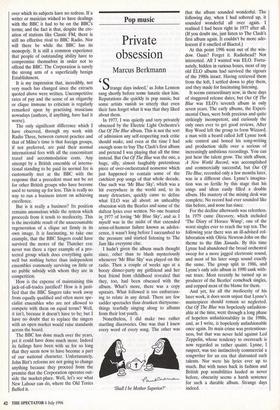Pop music
Private obsession
Marcus Berkmann
trange days indeed,' as John Lennon sang shortly before some lunatic shot him. Reputations die quickly in pop music, but some artists vanish so utterly that even their fans forget what it was that they liked about them.
In 1977, I was quietly and very privately obsessed by the Electric Light Orchestra's Out Of The Blue album. This is not the sort of admission any self-respecting rock critic should make, and even at the time I had enough nous to buy The Clash's first album and pretend I was playing that all the time instead. But Out Of The Blue was the one, a huge, silly, almost laughably pretentious piece of over-orchestrated nonsense which just happened to contain some of the catchiest pop songs of that whole decade. One such was `Mr Blue Sky', which was a hit everywhere in the world and, to its many detractors, quickly came to define what ELO was all about: an unhealthy obsession with the Beatles and some of the daftest lyrics ever written. No one boasted in, 1977 of loving `Mr Blue Sky', and as I myself was in the midst of that extended sense-of-humour failure known as adoles- cence, it wasn't long before I succumbed to the pressure and started listening to The Jam like everyone else.
I hadn't given the album much thought since, other than to blush mysteriously whenever `Mr Blue Sky' was played on the radio. Then a couple of weeks ago at a boozy dinner-party my girlfriend and her best friend from childhood revealed that they, too, had been obsessed with the album. What's more, there was a copy upstairs. What followed is too embarrass- ing to relate in any detail. There are few sadder spectacles than drunken thirtysome- things tearfully singing along to albums from their lost youth.
Nonetheless, I did make two rather startling discoveries. One was that I knew every word of every song. The other was 'Shall I be Mother Superior?' that the album sounded wonderful. The following day, when I had sobered up, it sounded wonderful all over again. I realised I had been right in 1977 after all. (If you doubt me, just listen to The Clash's first album again. It couldn't be more ado- lescent if it smelled of Biactol.) At this point 1996 went out of the win- dow. Oasis? Forget it. Radiohead? Not interested. All I wanted was ELO. Fortu- nately, hidden in various boxes, most of my old ELO albums had survived the rigours of the 1980s intact. Having retrieved them from the loft, I settled down to play them, and they made for fascinating listening.
It seems extraordinary now, in these days of staggered release dates, but Out Of The Blue was ELO's seventh album in only seven years. The early albums, the Experi- mental Ones, were both precious and quite strikingly incompetent, and curiously the only ones ever to get good reviews. After Roy Wood left the group to form Wizzard, a man with a beard called Jeff Lynne took sole control and honed his song-writing and production skills over a serious of increasingly ambitious recordings. You can just hear the talent grow. The sixth album, A New World Record, was accomplished and commercially successful, but Out Of The Blue, recorded only a few months later, was in a different class. Lynne's imagina- tion was so fertile by this stage that his songs and ideas easily filled a double album. His mastery of the mixing desk was complete. No record had ever sounded like this before, and none has since.
For the decline afterwards was relentless. In 1979 came Discovery, which included `The Diary of Horace Wimp', one of the worst singles ever to reach the top ten. The following year there was an ill-advised col- laboration with Olivia Newton-John on the theme to the film Xanadu. By this time Lynne had abandoned the broad orchestral sweep for a more jagged electronic sound, and most of his later songs sound exactly the same. The group split in 1986, and Lynne's only solo album in 1990 sank with- out trace. Most recently he turned up as producer of the Beatles' comeback singles, and copped most of the blame for them.
And yet, for all the mediocrity of his later work, it does seem unjust that Lynne's masterpiece should remain so neglected. Out Of The Blue was hopelessly unfashion- able at the time, went through a long phase of hopeless unfashionability in the 1980s, and, as I write, is hopelessly unfashionable once again. Its main crime was pretentious- ness, but that was never held against Led Zeppelin, whose tendency to overreach is now regarded as rather quaint. Lynne, I suspect, was too instinctively commercial a songwriter for an era that distrusted such talents. Nor were his lyrics ever up to much. But with tunes back in fashion and British pop sensibilities lauded as never before, obscurity seems a harsh sentence for such a durable album. Strange days indeed.


























































 Previous page
Previous page